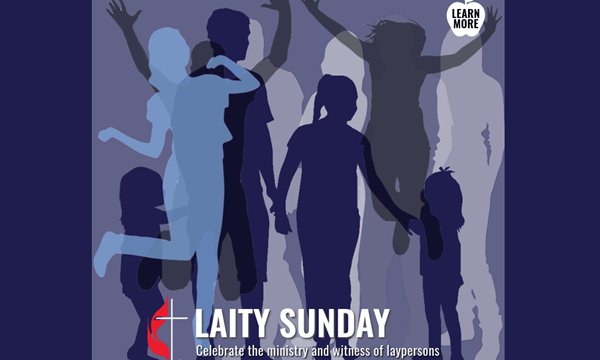A Moment for Mission
“Whoever wants to be great among you will be your servant.” —Mark 10:43, CEB
Laity Sunday celebrates the ministry of all Christians as they love God and neighbor. On Laity Sunday, we continue to lift up the vocation of all to follow the way of Jesus and lead others to him.
In the Fall of 1762 John Wesley wrote a short letter to a layperson and dear friend, Dorothy Furly. She had questions about something perplexing to both laity and clergy alike in the early Methodist movement: “Christian perfection” (aka sanctification or scriptural holiness). Was this some kind of rarefied state of flawless fidelity only attainable at death? Wesley’s response was simple: “I want you to be all love. This is the perfection I believe and teach.”
All love means “love all until all love God.” And all means all. Laity Sunday helps us remember that our purpose is a call to be love—with and for the world God so loves. And Wesley believed we could be all love in this life.
On Laity Sunday we remember and celebrate the mission behind the 24/7 efforts of the “all-called”:
“Beyond the diverse forms of ministry is this ultimate concern: that all persons will be brought into a saving relationship with God through Jesus Christ and be renewed after the image of their creator (Colossians 3:10).” —2016 Book of Discipline, ¶ 128, The Ministry of the Community (p. 97)
Children’s Message
Today is a special day called Laity Sunday. “Laity” means all the people in the church who aren’t pastors, like you, your parents, teachers and friends. It’s a day to celebrate how everyone, not just the pastors, can serve God.
(Hold up Bible) In Mark 10:35-45 James and John, two of Jesus’s disciples, asked Jesus for a special favor. They wanted to sit next to him in his kingdom, one on his right and one on his left.
(Hold up toy crown) They were thinking about being important and having power, like a king with a crown. But Jesus told them something different. He said that whoever wants to be great must be a servant to others.
To be great, according to Jesus, means feeding the hungry, visiting the sick, and helping in many ways. This is what Jesus wants us to do—to serve others with love.
On Laity Sunday, we celebrate all the people in our church who serve in different ways. Maybe you’ve seen people greeting at the door, helping with Sunday school or singing in the choir. These are all ways of serving, just like Jesus taught us.
Prayer
Loving God, thank you for the many caring, committed laity, who share their faith and labor in love and steadfastness of hope in our Lord Jesus Christ. In your name, we pray. Amen.
Offertory Prayer: Discipleship Ministries
Loving God, you teach us humility and service. We bring our offerings today with grateful hearts. As we reflect on your holy scripture today, may we give as a testament to our commitment to serve others, not seeking the highest places but embracing the path of sacrificial love. Bless these gifts and use them to advance your kingdom. Remind us that true greatness always comes through serving. In Jesus’s name, we pray. Amen. (Mark 10:35-45)
Newsletter Nugget
“Whoever wants to be great among you will be your servant.” —Mark 10:43, CEB
Laity Sunday is a special Sunday defined by General Conference “to celebrate the ministry of all lay Christians” (2016 Book of Discipline, ¶ 264.2). Usually observed on the third Sunday in October, Laity Sunday is one way we express the core Christian conviction that all are called to participate in God’s mission to create healthy, flourishing life in the world. Click here to read more about the history of Laity Sunday.
Consider how laypeople of faith have impacted your life:
Who is an example of a life changed by grace? What do you hear and see in that person’s story that resonates with your own life?
What are some ways we “hold on to” and celebrate stories of rescuing, redeeming love? [For example, do our worship services or small-group experiences create opportunities to share this kind of witness or testimony?]
What are the “word patterns” (conversations, gestures, things said, actions that speak louder than words, etc.) that you have witnessed in people in your own life who are examples of discipleship formed out of the pain of damaging experiences and the power of healing?
We say things that hurt. What’s one example from your own life where grace mended the damage of your own unhealthy words, turning them into the “holiness of conversation” that Wesley describes? Is that a story you have ever shared?

